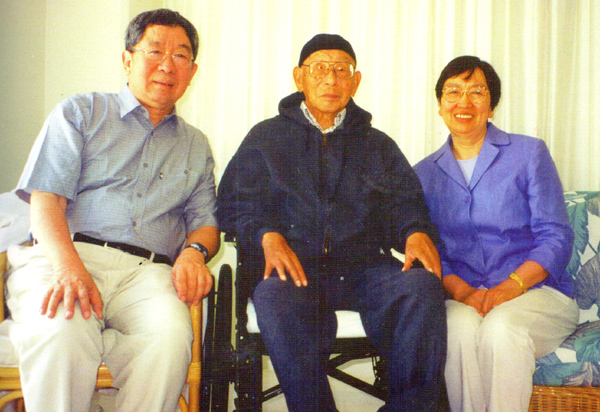The spy who saved the Soviets
By Zhao Xu (China Daily) Updated: 2015-08-26 07:45
 |
|
Yan Mingguang (right) and her younger brother Yan Mingfu (left) visit Zhang Xueliang in Hawaii in 1991. Photo Provided to China Daily |
Life on the move
"The family was constantly on the move, but even though we were far from home, my parents provided a new home for those in need," Yan Mingguang said. "Our two-story house in Chongqing was always full of people. My brother and I quickly got used to being woken in the middle of the night to make room for a newcomer, who might be a disabled ex-soldier in need of food and shelter.
"One time, my mother opened the door to a man who begged for money to buy penicillin for his dying daughter, so she gave him her gold ring," she said. "And of course there were also fellow communists, my father's dearest comrades. They were hidden on the second floor or in the attic above. The Nationalists had strong suspicions that father was a communist, but thanks to his alertness and the relationships he'd cultivated with those in power, those suspicions never came to anything."
After WWII, a civil war erupted between the Communists and the Nationalists, and Yan was at last allowed to reveal his true political leanings. When the People's Republic of China was founded on Oct 1, 1949, he was appointed to a number of posts, including that of deputy chief of staff at the Ministry of Foreign Affairs.
The bitter end
That prominence came to an abrupt end with the "cultural revolution" (1966-76). "My father was taken from home one night in November 1967. He died in prison on May 22, 1968 - although I only learned the actual date much later," said Yan Mingfu. "There's no name on my father's death certificate, just a serial number. My mother passed away in 1971, still not knowing what had happened to her husband."
In 1978, a year after the end of the "cultural revolution", Yan was rectified by the Chinese government.
"My father was finally laid to rest," said Yan Mingfu, who served as director of the United Front Work Department of the CPC Central Committee from 1983 to 1990, and worked to improve the tense relationship between the Chinese mainland and Taiwan.
In 1991, Yan Mingguang traveled to Hawaii to visit the 90-year-old Zhang Xueliang, who had been released from house arrest a year earlier.
"I told him what had happened to my father. Deeply saddened, Zhang, who had been the chief donor to the school my father founded in the northeast, proposed setting up a charity in my father's name. The Yan Baohang Public Philanthropic Foundation has existed for 24 years, and I am the honorary president and CEO," she said.
Reflecting on her father's life, Yan Mingguang said he had been a patriot first and foremost. "Throughout his life, my father searched for a truth that would bring prosperity to China. He fell under the influence of Christianity, which drew him close to Madame Soong, but he also looked into Buddhism and Taoism with great enthusiasm. Finally, Communism changed his life.
"People saw my father as a man of immense social grace, and for me his charm came from his passionate, sympathetic heart," she said.
"Back in 1967, sensing his imminent arrest, my father told me about his intelligence work during the war for the first time," she said. "He told me: 'Always remember, you father is a good man'."
Contact the writer at zhaoxu@chinadaily.com.cn




